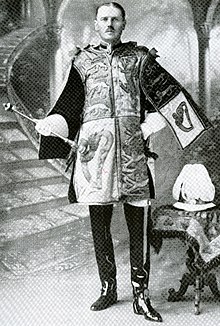William Peyton
| Sir William Peyton | |
|---|---|

William Peyton as Delhi Herald Extraordinary in 1911
|
|
| Born | 7 May 1866 |
| Died |
14 November 1931 (aged 65) Army and Navy Club, London |
| Allegiance |
|
| Service/branch |
|
| Rank | General |
| Commands held |
15th Hussars Meerut Cavalry Brigade 2nd Mounted Division Western Frontier Force in Egypt Fifth Army X Corps 40th Infantry Division 3rd Indian Division Scottish Command |
| Battles/wars |
Second Boer War First World War |
| Awards |
Knight Commander of the Order of the Bath Knight Commander of the Royal Victorian Order Distinguished Service Order |
General Sir William Eliot Peyton KCB KCVO (7 May 1866 – 14 November 1931) was a British soldier, a general of the First World War who fought in several other wars.
He was Delhi Herald of Arms Extraordinary at the time of the Delhi Durbar of 1911.
The third son of Colonel John Peyton, commanding officer of the 7th Dragoon Guards, Peyton was educated at Brighton College.
In 1885, Peyton enlisted in the ranks in the 7th Dragoon Guards, a regiment which his father had commanded between 1871 and 1876. The explanation of this was his failure to pass the entrance examination of the Royal Military College, Sandhurst. Having risen to sergeant, Peyton was commissioned as a second lieutenant in the 7th Dragoon Guards on 18 June 1887, and promoted lieutenant in 1890. He was appointed regimental adjutant in 1892. In 1896 he transferred to the 15th Hussars and was promoted captain.
He was seconded to the Egyptian Army and saw service with the Dongola Expeditionary Force in 1896, and was Mentioned in Despatches, then in the Sudan in 1897 and 1898, where he was dangerously wounded and his horse killed under him by a spear. In the Sudan he was again Mentioned in Despatches, and received the Distinguished Service Order. He was also awarded the Order of the Medjidieh, Fourth Class.
...
Wikipedia
